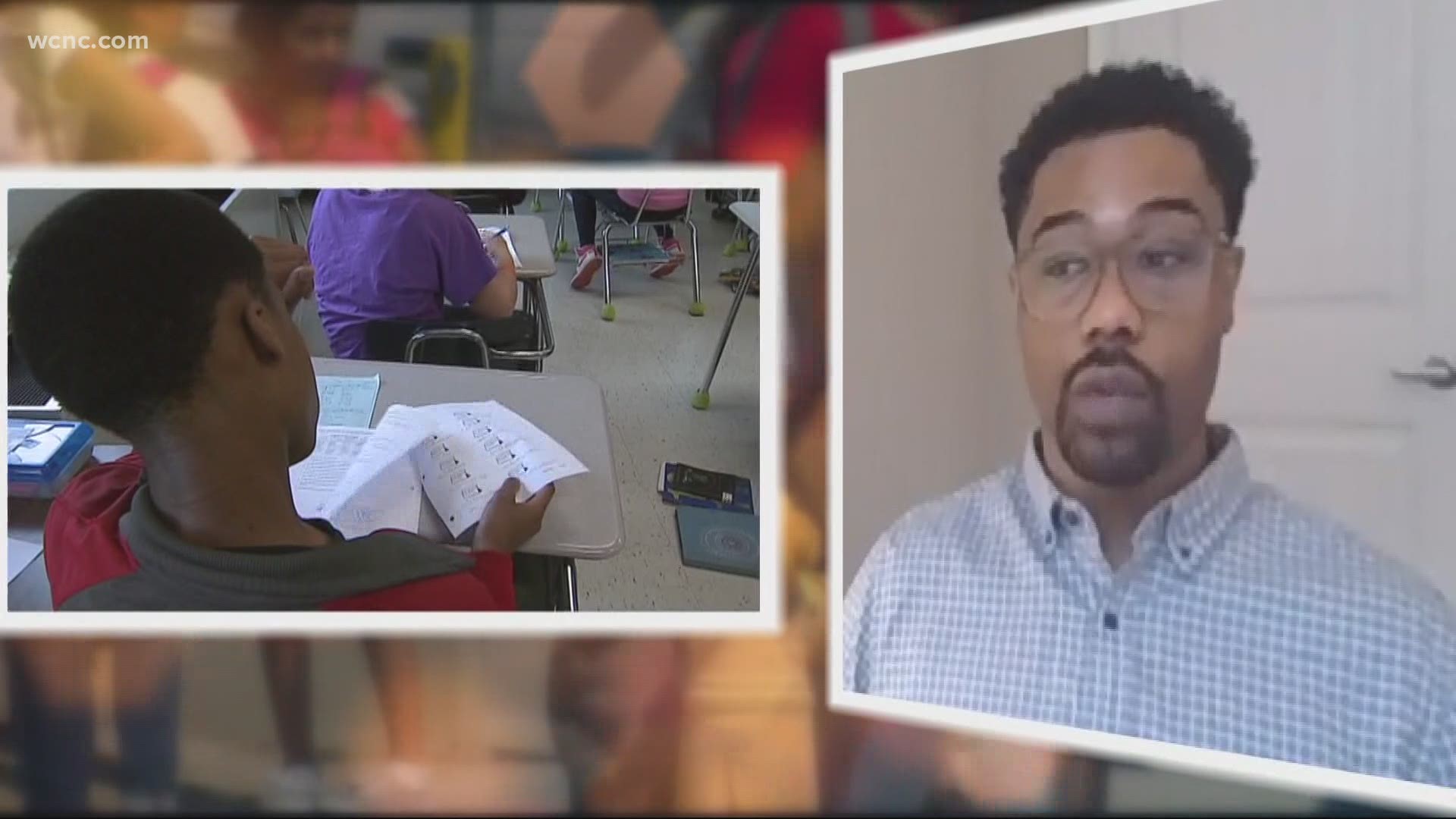CHARLOTTE, N.C. — Black students are seven times more likely to be suspended than their white counterparts, according to an analysis of data from Charlotte-Mecklenburg Schools that revealed a deep disparity in how students are disciplined.
The Southern Coalition for Social Justice released its “Racial Equity Report Card” last week. The organization analyzed data from the 2019-20 school year, examining categories like discipline, graduation rates, minority hiring, and student referrals to the justice system.
The data revealed a gap in every category.
“There are still major disparities,” Tyler Whittenberg, general counsel for the Southern Coalition for Social Justice said. “It leads to situations where they are more likely to fail than they are to succeed.”
Among the findings in the report:
- Black students were 7 times more likely than white students to receive a short-term suspension. Statewide, Black students were 3.9 times more likely than white students to receive a short-term suspension.
- Black students received 74.3% of short-term suspensions in the district, yet they comprise 36% of the student population.
- Black students account for 81.9% of school-based referrals into the criminal justice system.
“For many students, they are more likely to enter the justice system by going to school than they are by staying at home,” Whittenberg said. “When they go to school they walk through the door and they become targets…. These are very suffocating atmospheres for our youth that don’t feel nurturing or supportive.”
The coalition found similar disparities statewide.
Whittenberg said the disparities contribute to the “pre-school to prison pipeline” which he defines as “the system of policies and practices that push students out of school and into the juvenile and adult criminal justice systems.”
He challenged CMS leaders to take the gaps seriously: “If they want to talk the talk and walk the walk and provide equity for students of color that are attending their schools.”
Superintendent Earnest Winston said the school district was aware of the inequities before the release of the data.
“I will share sadly that this is not news to us,” Winston said. “I’m proud to say we are executing a plan to address the areas where racial discrepancies exist.”
Disparities in school discipline and suspensions have plagued CMS for several years.
Winston said they are further evidence of the need for anti-racism and implicit bias training.
“Many of the challenges that we’ve identified and are working to resolve are evidence of systemic racism which by its very nature is long-term in its development and which will take some time to dismantle,” Winston said.
Charlotte-Mecklenburg School Board chair Elyse Dashew said they recently adopted changes to the suspension policy that add more due process for students and place more emphasis on prevention.
“Ultimately you have to get to the root cause of this,” Dashew said. “What is it that kids need before they get in trouble.”
In response to the data, a spokesperson for CMS provided a statement to WCNC Charlotte, referencing the strategic plan the district has adopted to address equity and gaps.
“In the district’s Breaking the Link report, Charlotte-Mecklenburg Schools raised the serious concern of suspension disproportionality. In doing so the district identified a national issue with great local concern.
Since that time we have continued to monitor out-of-school suspensions (OSS) and in-school suspensions (ISS) by race in our annual reporting and through our performance dashboard on the district’s website. To reduce suspension disproportionality a multi-faced effort is underway that addresses disciplinary consistency, restorative practices, anti-racism and student social-emotional supports. As a complement to these efforts, key partnerships such as the School-Justice Partnership between CMS, Race Matters for Juvenile Justice, the Office of the District Attorney and Mecklenburg County law enforcement agencies, are working to shatter the school-to-prison pipeline in Mecklenburg County.
Though the Covid-19 pandemic slowed down these efforts, they will resume in the fall with intensity and determination in service of all of our students, particularly those who have been historically underserved. We appreciate the work of the Southern Coalition of Social Justice for joining us in maintaining attention on a serious national and local challenge.”
“We know we don’t have time to waste,” Winston added. “We need to move faster and we will move faster.”

